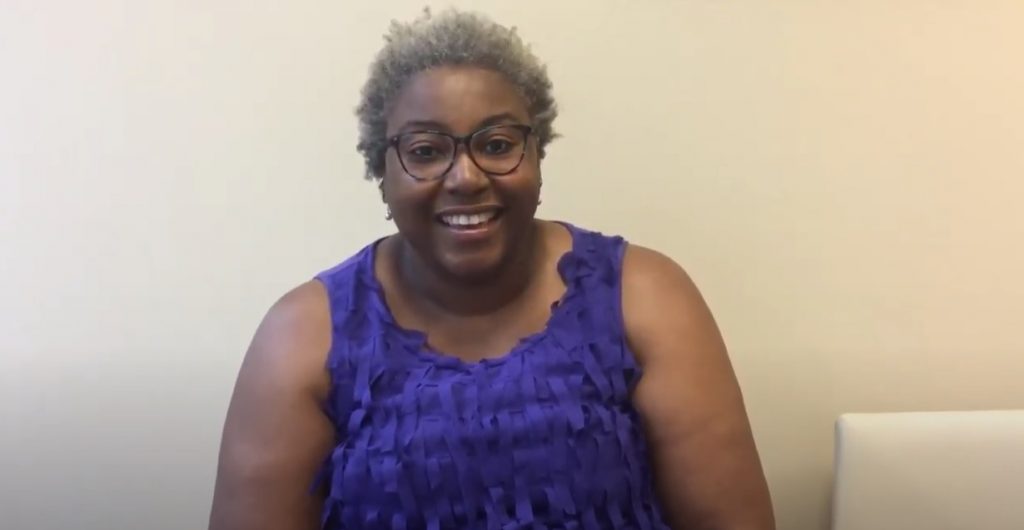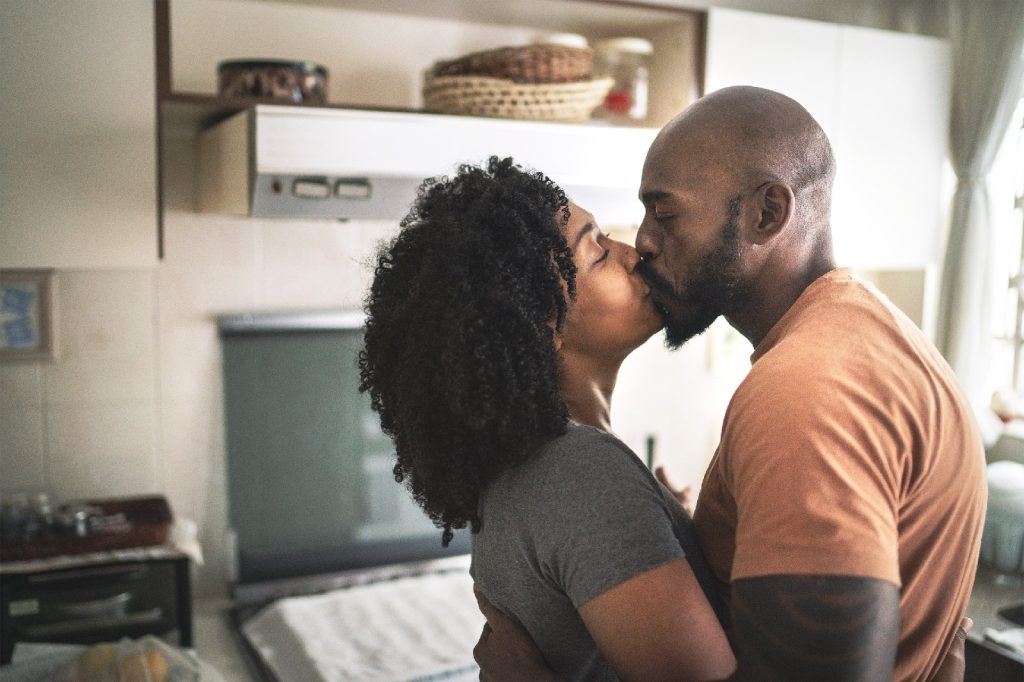In all the years they’ve been married, Samantha and Dereck have never had problems with their sex life. But lately, Samantha hasn’t been her usual self. Her desire to be intimate has been noticeably infrequent because of her growing uterine fibroids. She’s been experiencing symptoms ranging from heavy, longer than normal periods, feeling tired all the time, to bloating and extended abdomen. And when they do have sex, Dereck feels like all he’s doing is hurting her. That cycle plays itself out over and over, and needless to say, both Samantha and Dereck sometimes feel like it’s better just to go to sleep.
Of all the ways fibroids negatively impact a woman’s life, losing touch with her sex life can be the most frustrating. According to The Office on Women’s Health, 20 to 80% of women develop fibroids by the time they reach 50. While some are unaware they have fibroids, others experience symptoms that make sex life painful and even impossible. In one study, 23.5% of women with fibroids reported painful sex compared to 9.1% without the diagnosis.
The key is to look into treatment options right away. Uterine fibroid embolization (UFE) is a low risk, no incision, and faster option that shrinks fibroids rather than removing them. While UFE cannot guarantee a better sex life, more than 90% of women notice an improvement in their symptoms, which in turn can help all areas of getting back to living fully—including their sex life.
Are These Symptoms Interfering with Your Sex Life?
- Decreased sex drive (libido)
- Pain during sex
- Bleeding after sex
- Periods that last longer than usual
- Pelvic pain, pressure, or bloating
- Feeling the need to urinate more often
- Fatigue resulting from anemia
- Hormonal imbalances
- Body image issues leading to low self-esteem
The Link Between Fibroids and Your Sex Life
Fibroids are non-cancerous growths that develop from the muscle tissue of the uterus. They can develop inside, outside, and within the uterine walls. Depending on your situation, you may have one or several at varying sizes. While your gynecologist may feel some fibroids during a routine exam, you and your partner cannot. In fact, your partner may find it difficult to understand what you are going through.
If a woman is experiencing pain during sex, it is often because of where the fibroids are located and their size.
Location Impact of Fibroids
- Intramural fibroids — Grow inside the muscles of the uterine wall, causing issues with uterine function. Accounting for 70% of uterine fibroids, this is the most common type, affecting one in four of all women of childbearing age.
- Submucosal fibroids — Protrude underneath the uterine lining and into the uterine cavity. Some women notice heavy bleeding during menstruation and increased abdominal pain from this type of fibroid.
- Subserosal fibroids — Tend to grow just outside the uterine walls, impacting surrounding organs. As a result, these can put pressure on the bladder, bowels, and abdomen.
- Pedunculated fibroids — Hang by a thin thread or stalk inside or outside the uterus. These are more likely to cause pain in the abdominal area, due to obstruction of the uterus and surrounding organs.
Fibroids can grow as large as a melon and depending on their location, place extreme pressure on the uterus and cause pain at the point of penetration and deep in the vagina. This is especially true if any grow close to the cervix.
But the link between fibroids and your sex life doesn’t stop there. Fibroids are under hormonal control and tend to grow faster during the reproductive years when hormonal levels are at their highest. So, if you have a higher amount of estrogen affecting fibroid growth, this can be coupled with a decrease in your sex drive.
In addition to physical symptoms, women are also impacted emotionally.

Emotional Impact of Fibroids
- Body image — Some women may not want to have sex or show their body because they feel bloated and less attractive. Fibroids can cause an extended pregnancy-like belly appearance. As a result, they may go through prolonged periods of low self-esteem.
- Relationships — A woman’s sex life can also be impacted because she feels uncomfortable talking about her issues with her partner. Consequently, her partner will feel a loss of connection, leading to further strain on the relationship.
- Feelings of hopelessness — When your sex life is first impacted, it is difficult to understand what is going on. As a result, it is easy to start feeling as if you have no control over your feelings, emotions, and painful symptoms.
- Sexual unpredictability — Sometimes, sex is good. Other times, it’s not. Because of this unpredictability, it can be difficult emotionally for women to understand how their bodies and relationships will be impacted long-term.
Will My Sex Life Improve After UFE?
It would be irresponsible to guarantee that your sex life will be better than it was before fibroids because of undergoing any fibroid treatment. With that said, if the fibroids are no longer causing symptoms that can potentially return your sex life to what it was before fibroids interrupted your life. The goal of the UFE procedure is to cut off blood flow to all fibroids, causing them to shrink and die. As they shrink and die, you no longer have painful symptoms, which can in turn, help all areas of life—emotional and physical.

UFE is a unique, low-risk, highly successful procedure for fibroid treatment that allow patients to avoid complicated surgeries. During UFE our experienced and trained fibroid specialists insert a small catheter into the radial artery at the wrist. They use X-ray guidance to locate the vessels that supply blood to your fibroids, then inject small particles into the vessels to block the blood flow to fibroids. You have less pain and a quicker recovery time than fibroid surgery, all while reducing your fibroid symptoms.
A few advantages of UFE at Fibroid Institute include:
- No hospital stay
- Shorter recovery period (one week in some cases)
- No scarring
- Treat all fibroids at the same time
- No vaginal access
- >90% reduction of fibroid-related symptoms
- Uterus is spared
At Fibroid Institute, we are constantly having open and therapeutic conversations with our patients before, during, and after UFE treatment. There are also active online forums where women who have successfully undergone UFE share their stories and how their sex life has been impacted.
Would you like to hear from one of our patients regarding sex life and fibroids? Read Debbie’s experience here.

Here are just a few additional patient comments from online forums.
“Sex for me is much better. Not so painful as before.”
“I waited six weeks post because I was worried about infections. Only issue I initially had was some post sex spotting, which was minimal.”
I’m three months post and still haven’t. Still insecure about how my body looks and I have light discharge randomly. At some point I’m just going to have to try.”
“Honestly? Mine is WAAAAAAAY better. Freedom from pain and bleeding and my hormones are now in check.”
“After my fibroid started shrinking it was much better.”
Improve Your Life and Fibroid Pain at Fibroid Institute
Are you experiencing issues with your sex life because of fibroids? Medical Director and Founder of Fibroid Institute, Dr. Suzanne Slonim, endorses uterine fibroid embolization (UFE), the gold standard in non-surgical fibroid treatment. Our fibroid specialists in Dallas and Houston have helped thousands of women treat fibroids symptoms with UFE.
Most major medical insurance providers cover the cost of UFE. State-of-the-art equipment at our Fibroid Institute North office offers availability of onsite ultrasound and MRI imaging, allowing for a much more efficient evaluation of each patient’s candidacy for UFE. A patient can have her MRI and be seen immediately afterward, even possibly get scheduled during the same visit for her UFE, depending on insurance.
Need more information? Have questions? At Fibroid Institute, our team is dedicated to helping women become #FibroidFree. Schedule a consultation at our Dallas fibroid clinics at 214-838-6441 or Houston fibroid clinics at 713-903-3733 or complete the form below. In-office and telehealth appointments are available.
"*" indicates required fields
This information is not a substitute for professional medical advice. Prior to starting any new treatment or if you have questions regarding a medical condition, always seek the advice of your doctor or other qualified health provider.
Fibroid Institute Texas serves the Dallas and Houston areas including Fort Worth, Grand Prairie, HEB, Arlington, Hutchins, Irving, Duncanville, DeSoto, Cedar Hill, Lancaster, Cockrell Hill, Highland Park, University Park, Park Cities, Garland, Mesquite, Richardson, Dallas, Sherman, Houston, Sugar Land, Katy, Webster, Clear Lake, The Woodlands, Universal City, Spring, Kingwood, Stafford, Conroe, Texas City, Cypress, League City, Bellaire, Addison, Carrollton, Plano, Frisco, McKinney, Allen, and more.

